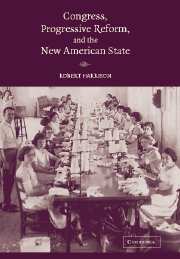Book contents
- Frontmatter
- Contents
- List of Tables
- Preface
- Acknowledgments
- Abbreviations
- Congress, Progressive Reform, and the New American State
- 1 Introduction
- 2 Congress and the Nation
- 3 The Troubled Subject of Railroad Regulation in the Progressive Era
- 4 Congress and the “Labor Question”
- 5 The Ideal of a “Model City”: Congress and the District of Columbia
- 6 The Senate and Progressive Reform
- 7 Patterns of Republican Insurgency in the House of Representatives
- 8 Progressivism, Democratic Style
- 9 Congress, Progressive Reform, and the New American State
- Appendix: The Analysis of Roll Calls
- Index
1 - Introduction
Published online by Cambridge University Press: 25 July 2009
- Frontmatter
- Contents
- List of Tables
- Preface
- Acknowledgments
- Abbreviations
- Congress, Progressive Reform, and the New American State
- 1 Introduction
- 2 Congress and the Nation
- 3 The Troubled Subject of Railroad Regulation in the Progressive Era
- 4 Congress and the “Labor Question”
- 5 The Ideal of a “Model City”: Congress and the District of Columbia
- 6 The Senate and Progressive Reform
- 7 Patterns of Republican Insurgency in the House of Representatives
- 8 Progressivism, Democratic Style
- 9 Congress, Progressive Reform, and the New American State
- Appendix: The Analysis of Roll Calls
- Index
Summary
The British novelist H. G. Wells visited Washington, “full of expectations and curiosities,” in 1906, during the course of the lengthy Senate deliberations on the Hepburn rate bill. What appeared to confront him as he sat attentively in the visitors' gallery was a scene of unmitigated confusion. While one member spoke, his colleagues wrote letters, noisily rustled newspapers, stood around in “audibly conversational groups,” walked carelessly between the speaker and the Chair, and occasionally summoned pages by loudly clapping their hands. The galleries were filled with “hundreds of intermittently talkative spectators.” “The countless spectators, the boy messengers, the comings and goings kept up a perpetual confusing bafflement…. I have never seen a more distracted legislature.” The disorderly scene that he witnessed in the Senate chamber seemed to reflect more fundamental defects in the American constitutional framework and in the organization of Congress itself: “The plain fact of the matter is that Congress, as it is constituted at present, is the feeblest, least accessible, and most inefficient central government of any civilized nation in the world west of Russia. Congress is entirely inadequate to the tasks of the present time.”
Wells's negative assessment was shared by other European commentators. Writing a few years earlier, the Russian political scientist Moisei Ostrogorski commented that Congress “does not initiate great measures, it does not solve the problems, the solution of which is demanded by the life of the nation.”
- Type
- Chapter
- Information
- Publisher: Cambridge University PressPrint publication year: 2004



